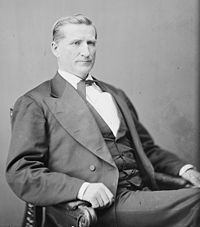John Goode, Jr.
| John Goode Jr. | |
|---|---|

John Goode Jr. portrait, between 1865 and 1880
|
|
| 3rd Solicitor General of the United States | |
|
In office May 1885 – August 1886 |
|
| Appointed by | Grover Cleveland |
| Preceded by | Samuel F. Phillips |
| Succeeded by | George A. Jenks |
| Member of the U.S. House of Representatives from Virginia's 2nd district |
|
|
In office March 4, 1875 – March 3, 1881 |
|
| Preceded by | James H. Platt, Jr. |
| Succeeded by | John F. Dezendorf |
| Chairman of the Committee on Education and Labor | |
|
In office March 4, 1877 – March 3, 1881 |
|
| Preceded by | Gilbert C. Walker |
| Succeeded by | Jonathan T. Updegraff |
| Member of the Virginia House of Delegates from Norfolk County | |
|
In office 1867 Alongside J. C. Langhorne, A. F. Leonard and Thomas Butt |
|
| Member of the Confederate States House of Representatives from Virginia's 6th district | |
|
In office February 22, 1862 – March 18, 1865 |
|
| Preceded by | Position established |
| Succeeded by | Position abolished |
| Member of the Virginia House of Delegates from Bedford County | |
|
In office 1852–1853 Alongside Samuel Davis |
|
| Personal details | |
| Born |
May 27, 1829 Bedford County, Virginia |
| Died | July 14, 1909 (aged 80) Norfolk, Virginia |
| Resting place | Longwood Cemetery Bedford, Virginia |
| Political party | Democratic |
| Alma mater |
Emory and Henry College Washington and Lee University School of Law |
| Occupation | Politician, lawyer |
| Military service | |
| Allegiance | Confederate States of America |
| Service/branch | Confederate Army |
| Rank | Colonel |
| Unit | Jubal Early's Staff |
| Battles/wars | American Civil War |
John Goode Jr. (May 27, 1829 – July 14, 1909) was a Virginia Democratic politician who served in the Confederate Congress during the American Civil War and then was a three-term postbellum United States Congressman. He was also the acting Solicitor General of the United States.
Goode was born in Bedford County, Virginia. He graduated from Emory & Henry College in 1848, studied law at Washington and Lee University School of Law and was admitted to the bar in 1851. That same year, he was elected a member of the Virginia House of Delegates, and in 1861 sat in the state convention that passed the Ordinance of Secession.
With the impending dissolution of the United States in 1861, Goode was elected to the Virginia secession convention. With the affirmative vote and Virginia's subsequent secession, Goode was elected to both the First Confederate Congress and the Second Confederate Congress, serving from February 22, 1862, until the end of the war, and during the recesses of that body acted as volunteer aide on the staff of Maj. Gen. Jubal A. Early.
...
Wikipedia
